In the afternoon of Wednesday, 15 May, activists set up tents on the bridge between Forum and Orion. The activists are calling on WUR to disclose and break all links with Israeli institutes. In this article, we keep you up to date on the developments.
Update Monday 8 July: Encampment not yet cleared
The Wageningen for Palestine protestors have not yet vacated their encampment on Monday morning, ignoring the executive board’s request to do so. This request was made in a message posted on the website and the intranet on Thursday.
‘We have not received any personal request to evacuate’, says spokesperson Matijn on behalf of the protestors. ‘Only scaling down security and removing the porta-potties as of last Saturday has been discussed.’ A bench and tent now occupy the spot near the entrance to Orion where the porta-potties were located.
WUR spokesperson Jan Willem Bol declines to comment on whether or not there are currently plans to evacuate the encampment. Responding to the comment that protestors have not been personally informed about the request to evacuate, he states: ‘We use updates on the site, intranet and MyWURtoday to reach as many members of the WUR community as possible simultaneously. That includes the protestors, who are also members of the WUR community. Hence, the message is directed at them too.’
The protestors have announced they intend to stay put (see the update of 2 July below).
Update Thursday 4 July: Executive Board asks activists to take down camp
The Executive Board confirms in a new update that WUR will not be breaking links with Israeli science institutions. That decision is final. The Board calls upon the activists to clear the camp because the Executive Board and the protestors on the bridge ‘are not going to get any closer on the issues in question.’
In its statement published on the intranet and the WUR website, the Board says it does not consider breaking links with Israeli science institutions to be the right path to take. The Board gives two ‘important and principled’ reasons: ‘We value the university as an independent knowledge institution. (…) Any (political) judgement we make reduces the space for open debate.’ And ‘We value academic freedom for our individual staff and students. You should be able to decide for yourself with whom to cooperate.’
According to the Board members, this conclusion means there is no chance of them and the activists getting any closer on the substance of the issues. ‘The activists have made their point loud and clear’ but ‘It is time for other important issues to be given full scope again’. The protestors are therefore being asked to take down the tents by the end of the week.
Update Tuesday 2 July 14:00: Wageningen for Palestine camp will stay put during the summer
The activists plan to stay in their tents on the bridge throughout the summer. While most students will be returning home or travelling abroad on holiday after their exams, the camp will stay. Spokesperson Matijn: ‘There are enough people prepared to stay in the tents over the coming weeks. It will be a quiet period, as no major actions are planned. But we do want to organize some protests during the AID week.’ The tents will be handy then. ‘There are always some AID first-years who don’t yet have anywhere to stay, and they will be welcome to spend the night here,’ says Matijn.
The final, small-scale action of the academic year took place last week when the protestors planted an olive tree next to the bridge and hung letters off its branches with ‘messages of hope and wishes for the movement’. Staff of Donker Groen, the gardeners that manage the campus grounds, tried to remove the tree on Friday, and damaged it in the process. The following day, the police dug up the tree. ‘Of course we knew they probably wouldn’t let the tree stay there, but it still feels pretty brutal,’ says Matijn.
There has been no contact between the demonstrators and the Executive Board since the road block on 19 June. Both sides are sticking to their positions: Wageningen for Palestine wants an open debate on collaboration with Israeli parties, while the Executive Board is only willing to discuss things in private.
The WUR spokesperson does not yet wish to comment on the news that the tents will be staying throughout the summer months.
A meeting is scheduled for 11 July to discuss collaboration between WUR and other universities and institutes. Nothing else is known at present about this meeting beyond the date.
Update Wednesday 19 June, 14:45 hrs: Blockade ended, bickering about conditions for discussion
Motorised vehicles can access the campus once more. After the blockade of the bus lane and the northern access road to the campus were lifted, vehicles can now also access the campus from the roundabout. At approximately 14.30 hrs, the protestors marched across the campus back to their tent camp on the bridge.
Earlier this afternoon, an Executive Board spokesperson stated that the EB is willing to speak with the protestors on the condition they lift the blockades, and the conversation takes place behind closed doors, as was the case in previous discussions between the EB and the protestors. The protestors, in turn, rejected this proposal and demanded that such a discussion be public and recorded on video because it is the ‘administration’s ethical, democratic and scientific duty to inform the academic community about WUR’s continuing complicity to genocide, occupation and apartheid’. They will not settle for less, they added.
Update Wednesday 19 June 9:30 hrs: Protestors block roundabout
Protestors of Wageningen for Palestine are blocking access to the campus using banners and bathtubs in hopes of pushing the executive board to attend a debate on a boycott of Israeli institutions. Moreover, they want the EB to come to the blockade to talk with them.
‘The executive board has planned a Let’s explore-session on the conditions under which WUR partners with universities and institutions. The session is to take place on 11 July. This is not enough for us’, says Matijn, spokesperson for the Wageningen encampment. ‘By that time, many will already have gone on their summer vacation, and it takes far too long for such sessions to be translated into policy. The decision on whether or not to collaborate with Israeli universities significantly impacts the academic community here, as well as the people of Palestine and Israel. We feel it is the EB’s responsibility to explain in a debate why they continue this collaboration, which is why we have chosen to step up our protests. We feel pushed to increase the pressure.’
Police and security are present at the roundabout but are currently not intervening a WUR spokesperson states. ‘We are not responsible for deploying the police. That is up to the mayor, police and public prosecutor. The executive board has no intention of entering into a discussion with the protestors at the roundabout as they will not be swayed by threats and coercion.’
Drivers wanting to visit the campus are being rerouted along the bus lane a little further along the Mansholtlaan, which has since been blocked by the protestors as well. Drivers respond with resignation, although some honk encouragingly at the protestors.
Update Monday 17 June 17:00 hrs: Executive Board absent at debate
The executive board (EB) has stated it will not attend the debate on a boycott of Israeli institutions this evening. The EB sent the protestors an email at noon today. The protestors say the debate will continue as planned.
‘The debate has been set up in a way that forces us to “defend” ourselves and has a desired outcome. We feel this is unbalanced and not academic’, says the email, which was written by Rens Buchwaldt on behalf of the EB. ‘Moreover, we expect the chosen set-up will prevent the diversity of opinions within our community from feeling welcome and represented in this debate.’
The protestors regret the EB’s absence. ‘We wanted three things: a public discussion on the topic of a boycott’, says spokesperson Noor. ‘We are open to all forms of debate as long as there is room for different perspectives. We clearly stated this in our open letter, and that still stands. We regret that the EB communicated their absence on Monday afternoon while the debate was planned for that very evening.’
The EB sent its email message to everyone who sent an email message requesting a debate. Some 60 people had responded to a call on social media posted by the protestors, which provided a link to email the board.
Update Tuesday, 11 June, 15:00 hrs Dialogue remains obstacle
The two parties have been in contact, and both indicate they are willing to enter into a dialogue but under different conditions. The protesters wish to debate with the executive board and the entire academic community on a boycott of all partnerships with Israeli academic institutions. That demand was made during the (failed) occupation of Atlas last week Wednesday. And that demand remains firm. Spokesperson Noor: ‘Especially now that the university rectors, WUR’s rector included, have indicated the wish to have an open academic debate in an open letter in Trouw published last weekend.
WUR spokesperson Jan Willem Bol says that dialogue is still possible because ‘no solution will be reached without talks.’ ‘But,’ says Bol, ‘boundaries were crossed last week Wednesday’ (see updates below, ed.) when the protesters attempted to gain entry into the Atlas building. Thus, a second report has been filed against the protesters. In addition to the report on group defamation, the protesters have been reported for trespassing. Both reports are under investigation, says Bol.
‘We called on the protesters last week to join us in reflecting on the events of last Wednesday afternoon, but they refused.’ The activists referred to the demand for a debate, which they had made during their attempt at occupying Atlas. Bol: ‘Had the occupation succeeded, we would have been pressured to justify WUR’s course of action. That is something we will not do under any circumstance.’
The protesters still intend to organise the debate, probably on Monday, 18 June, says Noor. ‘We are still searching for a venue. We hope the executive board will be present. As I said, the letter in Trouw says they want an academic debate, and that is precisely what we have asked for.’
Meanwhile, the petition initiated by -among others- associate professor of Rural Sociology Joost Jongerden has been signed by over 300 employees. The petition calls on the executive board to immediately sever all institutional ties with Israeli institutes.
Update Wednesday 5 June, 15:15 hrs
At around 15:00 hrs, the Atlas building was evacuated. All of the employees were directed out of the building through the bicycle shed in the basement. At this time, some protesters are erecting a tent on the Atlas ramp directly in front of the entrance. Because of the protests, the Atlas building is closed this Thursday. Employees work from home or from other locations on the campus. The protesters have vacated the ramp.
Update Wednesday 5 June 14:45 hrs.
The police intervened in a demonstration at Atlas today. During the demonstration, dozens of protesters attempted to enter the Atlas building but faced a closed door. A group of some five protesters then tried the bicycle shed but were stopped by a WUR employee, which culminated in an altercation. Twelve police officers arrived on the scene promptly. The protest is ongoing at this time.
At 13:00 p.m., the demonstration started with a traditional Palestinian dance in front of the Forum building. About twenty-five protesters joined the dance, after which dozens marched across campus towards Atlas. When they failed to gain entry because the door had been locked as a precautionary measure, the protesters continued their demonstration on the ramp leading up to the entrance.
Upon the police’s arrival at the scene after the altercation, the protesters chanted slogans such as ‘cops off campus’ and ‘shame on you’. Most of the protesters left the ramp after a discussion with the police to continue their demonstration on the grass below the ramp, but some ten protesters continued their activities on the ramp.
Update Wednesday 29 May, 15:00 hrs
De protesters demand the executive board (EB) apologise for filing charges on the grounds of group defamation. The EB filed charges on Tuesday afternoon, following an incident one day earlier in which the protesters equated zionists with nazis. ‘In doing so, the EB essentially accuses us of antisemitism, which is not okay’, says Noor, on behalf of the protesters. ‘Hence, we demanded apologies from the EB this morning, once they realise this complaint will lead nowhere.’
The activists are not at all concerned over the repercussions of the complaint. ‘We believe it will lead nowhere. Zionists are not a group but a political ideology; hence, there are no grounds to call this group defamation.’
The students in the tent camp will hold an internal meeting this afternoon to discuss the matter. Noor: ‘Everyone speaks for themselves during these protests. Some may shout a slogan, and others may repeat it. Before Monday, I had not heard the slogan about zionists. We agreed to discuss amongst ourselves if we disagree with certain statements, and that is currently the case.’
The protesters held a so-called teach-in in Forum on Tuesday evening, on the subject of ‘anti-Zionism versus antisemitism’. Members of the Jewish community attended also. Noor: ‘After two presentations, there was room for questions and discussion, and we also discussed informally after the event. That discussion was calm and reasonable. We discovered there were more similarities than we expected; we agree that calling each other names from a distance is not a good idea.’
Update: Tuesday 28 May 14:32 hrs
The slogan ‘Zionists are all the same; nazis by a different name’, which was chanted during yesterday’s protest, transgressed boundaries, says WUR. It has filed charges of criminal group defamation. The protesters have been informed.
‘We feel a boundary has been crossed’, says spokesperson Jan Willem Bol. WUR has officially reported infringement of the public policy and group defamation in particular. The legal ramifications are not yet clear. ‘That is up to the judge.’ The police will examine the evidence first. ‘For us, it is also about setting a boundary’, Bol says.
According to the spokesperson, the charges do not affect the demonstration. ‘You may voice your opinion on the campus, but certain rules apply. One of these rules is that overnight protests are not permitted, but we tolerate this nonetheless. That won’t change. Neither will the teach-in on this topic that the students requested because we see that this form of dialogue works. However, the students must leave the building after the event. In any case, calling Zionists nazis thwarts efforts to have a constructive conversation.’
The students and employees that have so far served as contacts for the executive board have been informed.
Update: Monday, 27 May, 17:24 hrs
The executive board condemns the slogan equating Zionists to Nazis. The cry ‘Zionists are all the same; nazis by a different name’ caused a commotion during this afternoon’s protest. Spokesperson Vincent Koperdraat declares that the executive board intends to discuss the events with the protesters today. Whether the incident will affect protests on the campus is still under debate.
Rector magnificus Carolien Kroeze talked with Dror Shalit, spokesperson on behalf of some members of the Jewish community, at length immediately after the protest. ‘He was able to vent his emotions and explain the effect this slogan has on him’, Koperdraat says. ‘More so now than during previous protests.’
Shalit already protested the use of the slogan ‘From the river to the sea, Palestine will be free’, asking the executive board to set restrictions for the protesters’ slogans. Comparing to Nazis goes even further. ‘We as WUR feel boundaries were crossed today’, says Koperdraat. ‘That includes the fact that this protest was held inside a building. The freedom to protest is important, but the way in which a protest takes place can be the subject of debate. And we intend to make it so.’
Update: Monday, 27 May, 15:15 hrs
The protesters were present once again during lunch break on Monday afternoon. In addition to a walk-out, they held a demonstration in Atlas, which some found offensive.
The protesters aimed to reflect on the lives that were lost due to Israeli airstrikes on Rafah last weekend. Board member Rens Buchwaldt unsuccessfully attempted to steer the protesting students towards the exit -entering buildings and disrupting education and research is not permitted under the protest protocol. The protest lasted some ten minutes, after which the students voluntarily vacated the building.
The demonstration consisted of protesters shouting for a full minute to speak for the victims of this weekend’s fire caused by a strike on a tent camp near Rafah. They went on to lie on the ground in “mourning” for several minutes, accompanied by an audio recording of an Islamic call to prayer. In retrospect, it was not the best choice, said the protesters. ‘This is not a religious war.’
Offensive protest cries such as ‘Zionists are all the same; nazis by a different name’ were chanted, causing severe emotions among some students and employees, who reported the incident to the executive board.
Update, 22 May 11:15
At around 9:30 this morning, a handful of demonstrators caused a disturbance at the entrance to the F&A Next conference in Omnia. The activists stood next to the main entrance, waving flags and cardboard signs and banging drums. A security officer guided conference attendees to a side entrance to the building while activists stayed next to him, drumming and waving a Palestinian flag.
More and more demonstrators joined the protest in the course of the morning. Activists gathered at the other entrances to Omnia too, where they made a racket with their drums and megaphones, and prevented people from entering the building through these entrances too. The conference organizers decided to take the attendees to Orion instead.
‘I am not happy about this,’ says WUR spokesperson Jan Willem Bol. ‘We have rules for protests, one of which is that demonstrators are not allowed to disrupt events. By blocking access to the conference for attendees, the protestors are breaking these rules.’
The activists have left the area around Omnia, and the conference with all the participants has now started in Omnia.
Update 21 May 16:45
The Wageningen For Palestine activists have announced a new action in partnership with XR Wageningen, XR Justice Now!, Scientist Rebellion Wageningen and End Fossil Occupy WUR. They plan to disrupt the Food & Agrotech Summit on Wednesday morning. ‘Genocide and ecocide are closely related: the same organizations that are responsible for damage to the environment also have a history of abusing human rights,’ says Archie, a spokesperson for Wageningen For Palestine. ‘Many of these organizations are involved in the occupied territories and other illegal practices.’
The activists also say they did not have any further negotiations with the Executive Board on Tuesday. ‘Before the weekend, we were talking to them several times a day. Then they said we would talk further on Tuesday, but we haven’t heard anything yet from them today. This morning we had a kind of “lift chat” where they came and said hello.’
Updates 16 and 17 May
Update, 17 May 16:45: As of next academic year, two scholarships will be offered every year for students from conflict zones. The Executive Board made this gesture in the latest statement after talks with the activists. In addition, current projects in conflict zones will be reviewed if changing circumstances give cause to do so. Furthermore, an event or dialogue will be organized to look at how to behave with respect to one another in times of conflict. The activists are still considering their response.
Update 16 May 13:50 hrs: This morning, the Executive Board published a list of WUR’s collaborative links with Israeli universities and research institutes The demonstrators see the publication of the list of collaborative ventures as ‘a step in the right direction’ but they do not think WUR has met their first demand in full by doing this, says Noor, spokesperson for the activists. ‘This morning, four of us demonstrators negotiated with the rector, the dean and a spokesperson for the university. We discussed this as well then. We put a number of questions to the board and they had questions for us too. The board didn’t have answers to all our questions so we will be meeting again later. At any rate they are prepared to meet with us, which we are pleased about as that is not the case everywhere.’
One of the questions the demonstrators want an answer to is whether human rights violations take place in the projects in which WUR collaborates with Israel. ‘That is one of the requirements WUR makes in its own Principles of Collaboration. But the board was unable to confirm that no human rights violations take place at the science institutions with which WUR collaborates. The board was also unable to say whether the collaborative ventures take place in occupied territory. We hope to get answers to these questions in due course.’
Update 16 May 11:35: This morning, the Executive Board published a list of WUR’s collaborative links with Israeli universities and research institutes. In so doing, it is meeting one of the demands of the demonstrators. The board stresses the necessity of such partners in order to address massive global challenges such as climate change and loss of biodiversity.
WUR works with Israeli institutions in three ways: through student exchanges with the Hebrew University of Jerusalem, as a member of the Euroleague for Life Sciences Universities initiative, and through research projects in international consortia, funded by the EU. ‘All the collaborations are within WUR’s academic domain. None of then are related to warfare or developing military knowledge,’ states the board.
Hundreds of institutes are involved in the large research consortia, including the following Israeli ones: Hebrew University of Jerusalem, Ben-Gurion University of the Negev, Reichman University, University of Haifa, Israel Oceanographic and Limnological Research Limited, Tel Aviv University, Weizmann Institute of Science en The Agricultural Research Organization of Israel.
Updates Wednesday May 15
At around 16:30 hours on Thursday 15 May, a few staff members braved the rain to stand with the activists who have set up tents on the bridge between Forum and Orion. Besides expressing their support for the demonstrators, the staff members do not want the freedom and safety of protesting students to come under threat. They therefore appealed to the Executive Board to choose a ‘path of de-escalation’ in its discussions with the campaigners, rather than to call the police.
Update 21:04: Spokesperson Noor announced at around 9 pm that about 50 students were allowed to stay and that there had been talks between representatives of the demonstrators and the board (Carolien Kroeze and Rens Buchwaldt) and education director Arnold Bregt. Noor said the WUR had ordered Dixies (public toilets) for the night. ‘We talked with board members for an hour and a half this afternoon. It was a good discussion, heated but constructive. WUR has promised to document its collaborative links with Israeli parties. They are not sure yet whether they will publish the list in the near future. Talks will resume at 10 o’clock tomorrow on our demand for transparency and on our other demands. For example, we haven’t discussed scholarships for Palestinian students yet.’
The mood in the ‘tented camp’ is optimistic, says Noor. ‘But we are staying alert. Because of course we think it’s good that we can stay and that Dixies have been arranged, but as a Dutch politician once said, “Chattering won’t put a roof over anyone’s head.” We will go on fighting for an important cause. We don’t want to be over-optimistic after the talks and think: “Oh, everything will be alright now”. WUR still has to produce the goods. Seeing that Rotterdam University of Applied Sciences has broken its ties with Israel, and so have Spanish universities, it can be done in Wageningen too.’
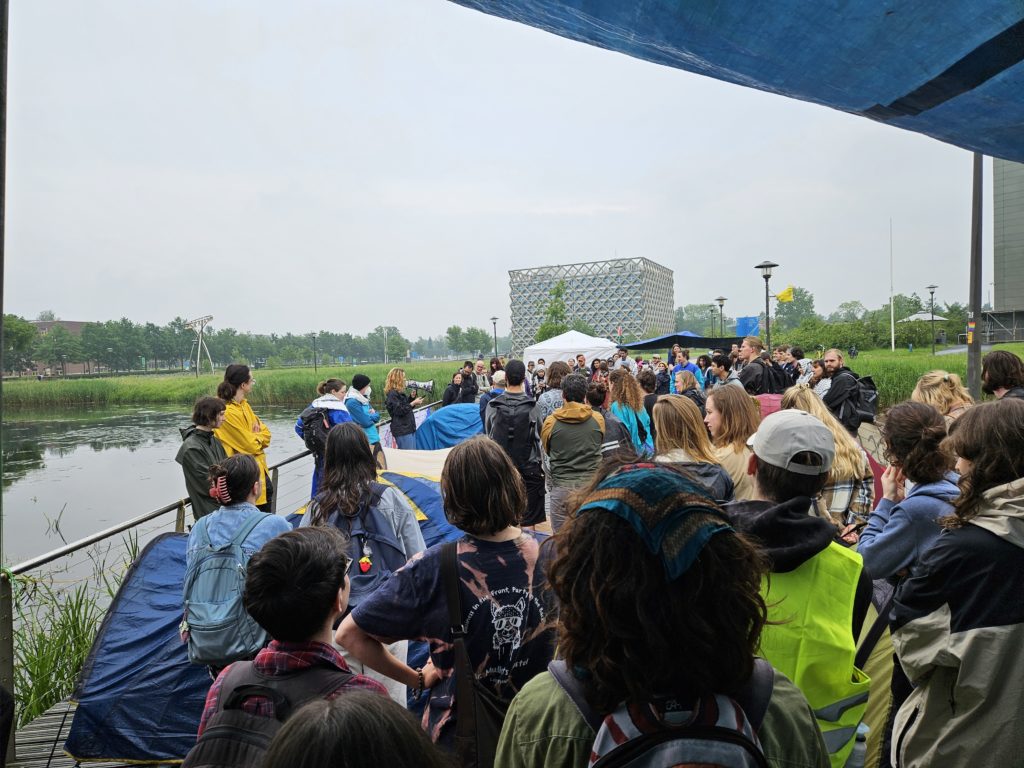
Update 18:10 hours: After a speech and poem read by one of their number, several WUR members of staff handed out coupons for free coffee and watermelon-flavoured ice lollies. The water melon is a symbol of Palestine because its colours resemble those of the Palestinian flag. Bottles of water were passed around as well.
One associate professor who would prefer to remain anonymous explained why she came to express her support for the demonstration. ‘The brother of a friend of mine was at the protest in Amsterdam and he was beaten by the police for no reason. I was really shocked by that, and we must prevent that from happening here.’ She joined the walkout last Monday too.
‘I was a bit disappointed by the staff turnout, at least on our side of the bridge,’ said an anonymous full professor. ‘But it was raining cats and dogs.’ She understands the demonstrators’ demand that WUR cut its ties with Israel. ‘I do think our university could stop collaborating with Israel.”
Staff members have called on the Executive Board to hold talks with the demonstrators and to choose a ‘path of de-escalation’ rather than to mobilize the police.
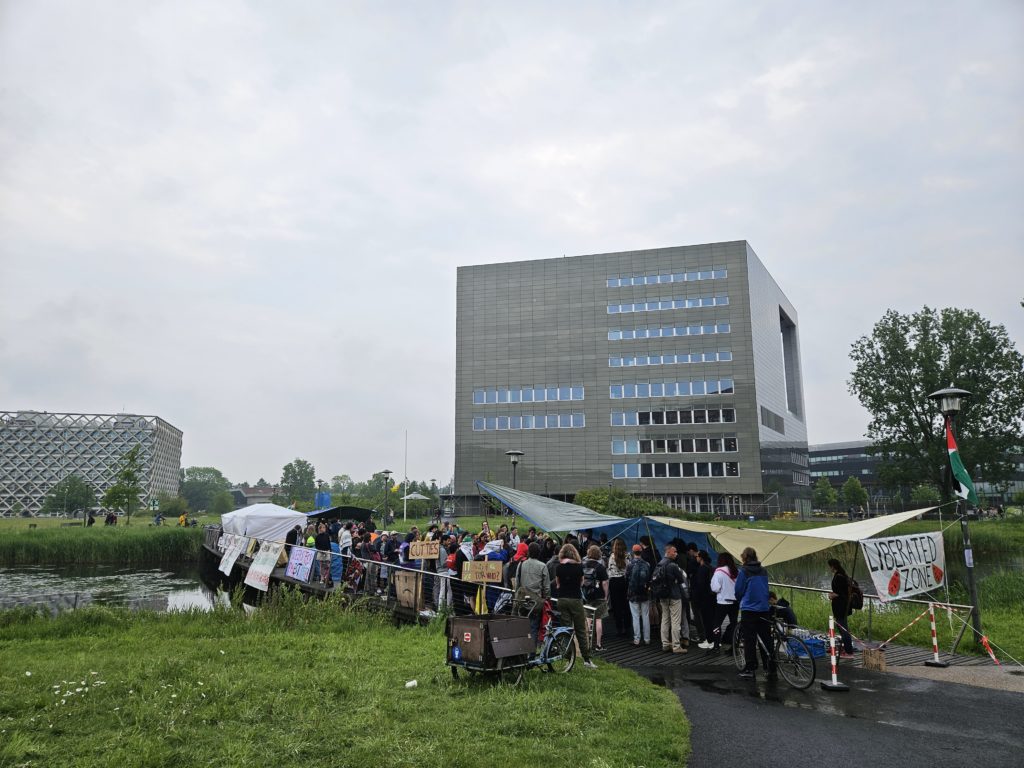
[Original report at 15 May 13:05 hours]
Around lunchtime, there were about ten tents and some 40 people on the bridge. The activists are calling on WUR to publish and break all links with Israeli institutes, says Noor, one of the group’s spokespeople.
The activists also want special study scholarships to be set up for Palestinian students. ‘We want this because all Gaza’s universities have been destroywd in the war.’
Recent protests in other cities such as Amsterdam and Utrecht got out of hand, with the riot police being called in to clear buildings. That is why as a precaution the activists have designated certain people to act as contacts for the police and media, explains Noor. ‘I hope we can keep it peaceful, and that the Executive Board is willing to talk to us.’
The activists plan to stay put until their demands are met.

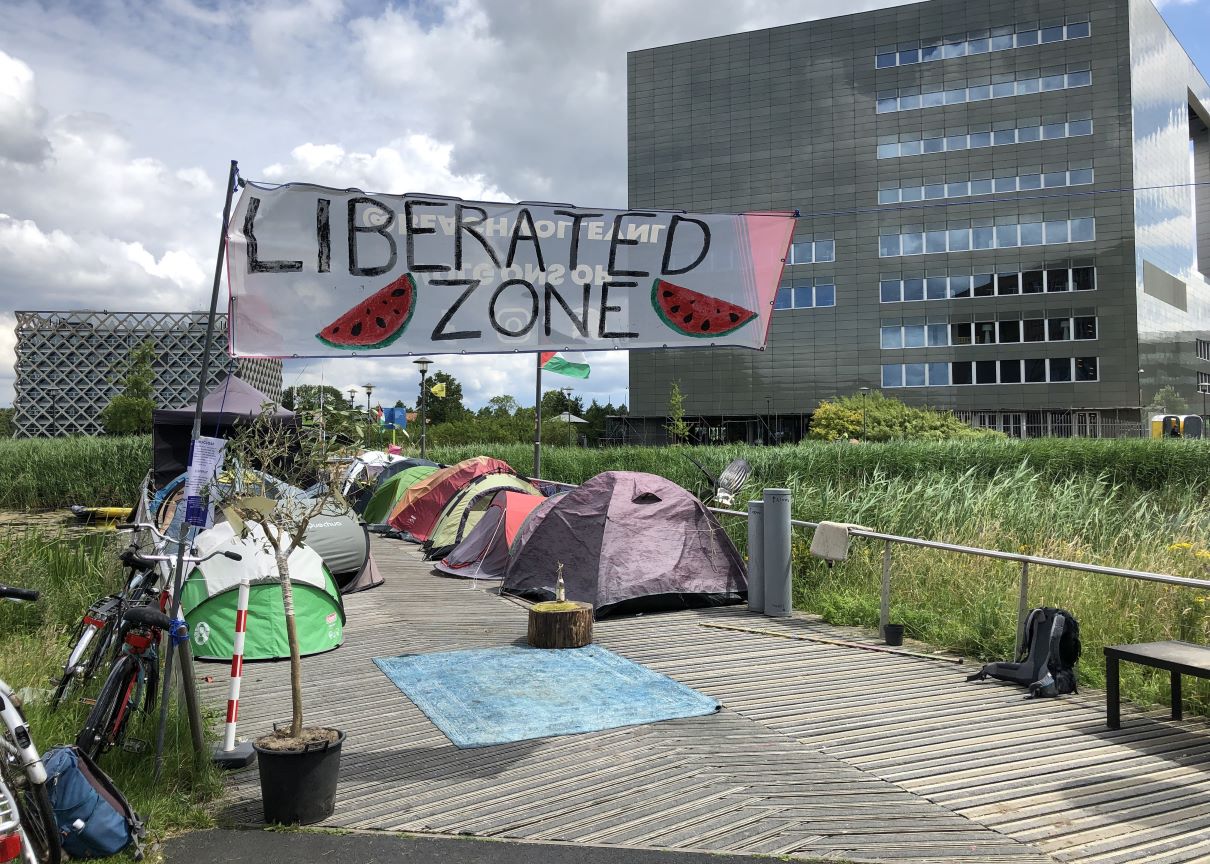 The encampment on 1 July. Photo Resource
The encampment on 1 July. Photo Resource 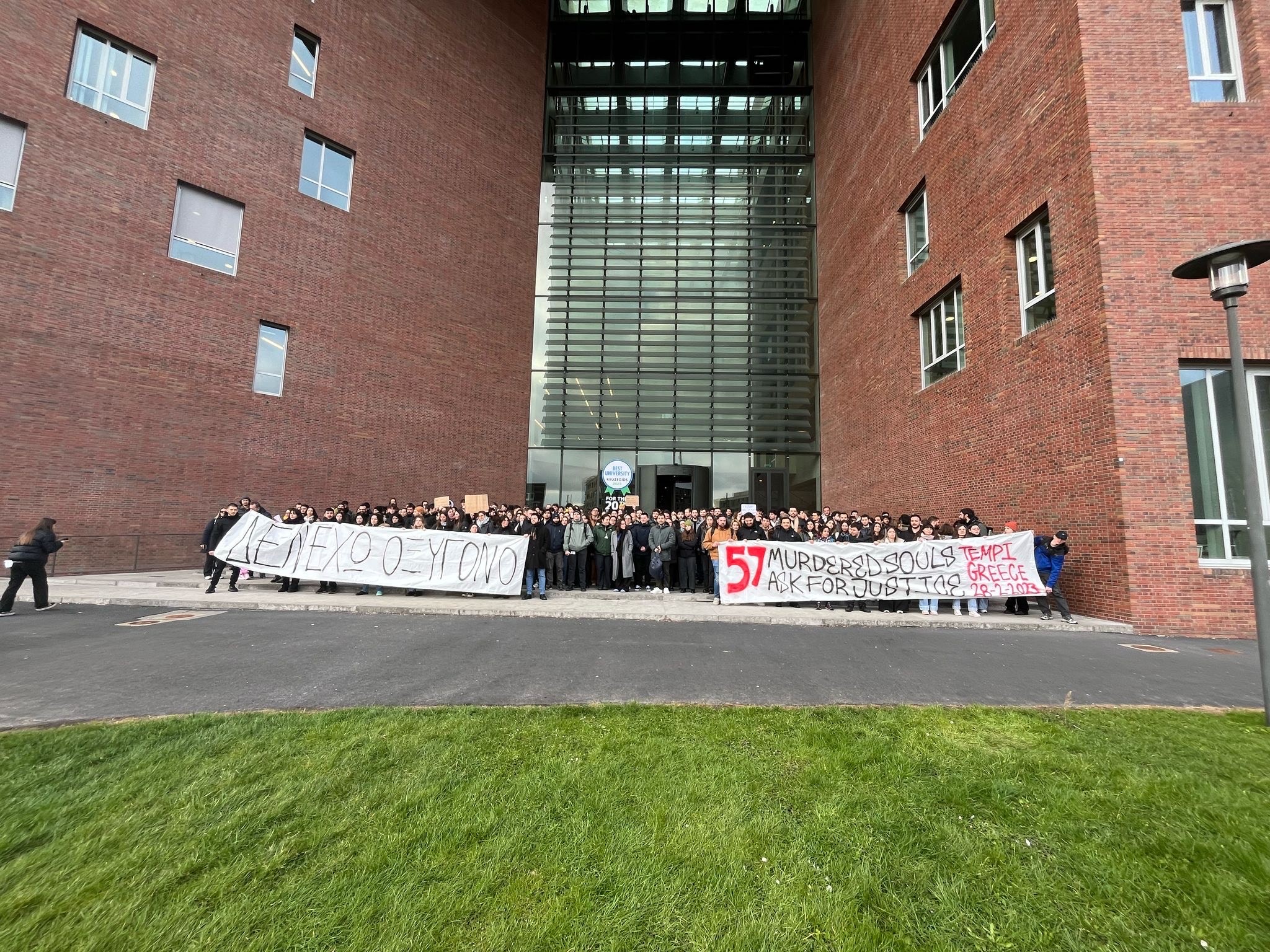
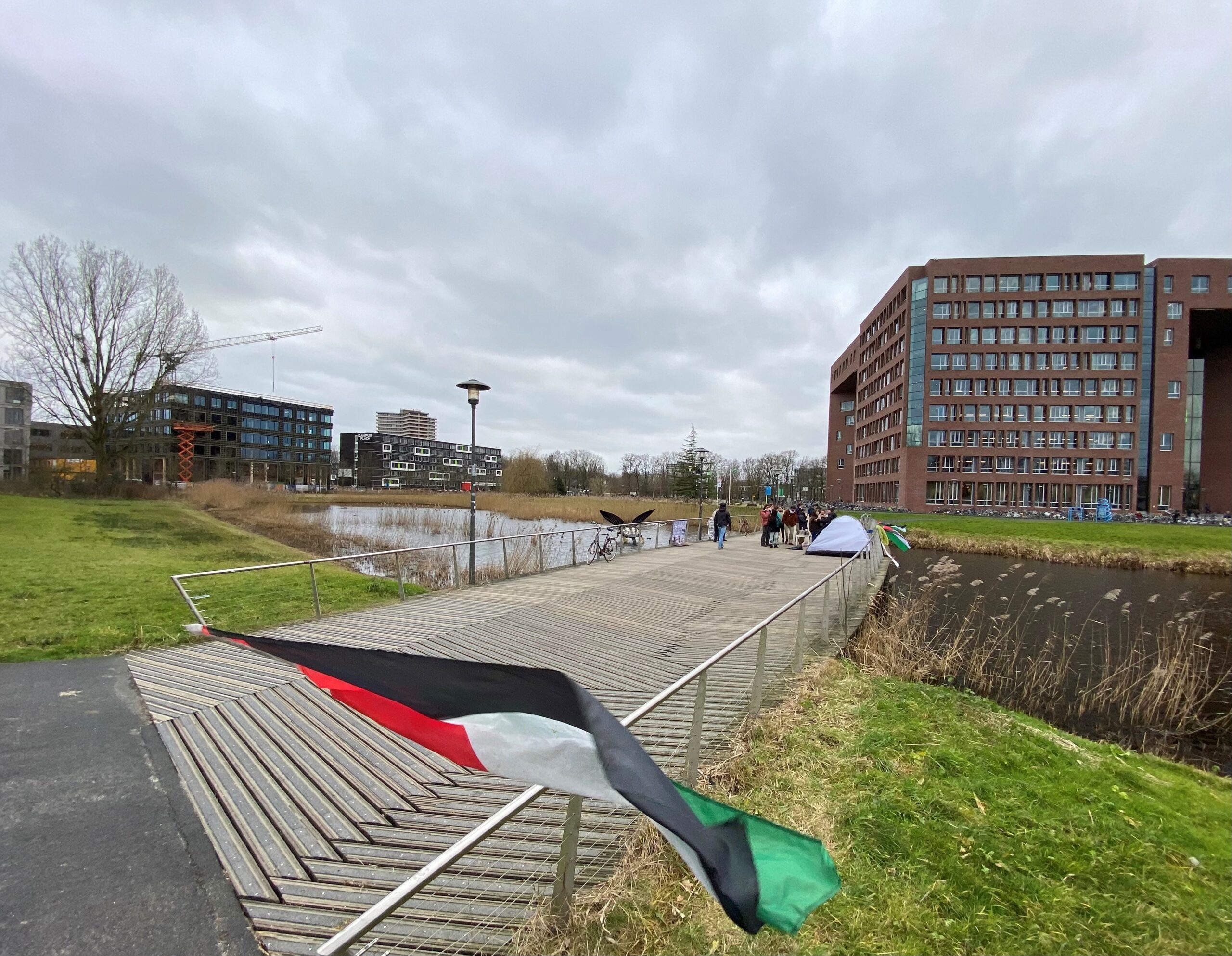

WUR is wrong, suing the protestors (their students) crosses the boundaries. How is a group of students with limited resources meant to fund their case against the uni? How does this actually contribute to getting justice? It does nothing, except for squash democracy within the WUR.
I’m ashamed to be a student at this university today, and the executive board should be ashamed of itself.
James, are you implying that people of slender means can just violate the law? Is ethics income-dependent? You should be ashamed indeed, of your poor reasoning.
Roelof, are you sure you want to speak to a WUR student in this way? The police decided not to take the universities complaint into consideration, as they did not violate the law. Insinuating that they did is really poor reporting
Did resource ask for a statement by the protestors in response to the filed charges of group defemation? It is part of standard journalistic practice (hoor en wederhoor).
Yes we did. You can read it in our update.
I see, well done
In all likelihood these charges will be dismissed, as I would think they have no basis in law. But there is a bigger issue here. No matter our different takes on the merits of the slogan that was chanted, all staff and students should be very concerned about how the Board has acted. The Board has attempted to criminalize protest on campus, based on their own subjective feelings about what they consider to be acceptable speech. That is hugely problematic. This may have a chilling effect on open debate on campus. Are staff and students to now reconsider what we say in fear that the Board may file criminal charges against us based on their own whims?
It is worrying that the Board appears driven by short term emotions, and reactionary decision making.
**LET’S MAKE WUR AN ETHICAL INSTITUTION – SIGN THE OPEN LETTER**
As individual academics we strive to maintain the highest ethical standards in our work. We want our university to do the same. WUR maintains institutional relationships with Israeli universities that are complicit in human rights violations and violations of international law. As WUR staff, we should not accept that our university fails to live up to the basic principles of human rights in its institutional relationships.
Sparked by the student protest, the Executive Board has entered discussions about WUR’s institutional ties. Yet so far, the Board claims it does not assess partners.
Now is the time to join our voices and demand the Board act. Concerned staff have drafted a new open letter to the Board renewing our call for the Board to show leadership. We urge you to read the open letter below and sign using the following link https://forms.office.com/e/g3WT3itngD
Please share the open letter with your colleagues and in your networks at WUR so we can all have our say.
How can you square saying that ‘Zionists are not a group’, but also that: ‘Zionists are all the same’. The latter clearly implies a group of people.